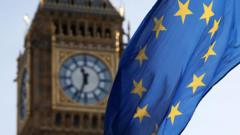The upcoming UK-EU summit marks a pivotal moment in relations post-Brexit, driven by shared global challenges. Key discussions will focus on trade barriers, defence cooperation, and mobility agreements, reflecting a shift from prior resentments towards constructive partnership amid rising geopolitical tensions.
UK-EU Summit: A New Chapter Post-Brexit Amidst Global Tensions

UK-EU Summit: A New Chapter Post-Brexit Amidst Global Tensions
As the UK and EU prepare for their first summit since Brexit, geopolitical concerns reshape the dialogue, igniting negotiations on trade, defence, and mutual cooperation.
The first bilateral summit between the UK and the EU since Brexit is set to unfold in London on Monday, symbolizing a critical juncture in post-Brexit relations. Despite previous animosities, both sides now recognize the urgency to collaborate in light of pressing global issues. The ongoing tensions involving Russia, the war in Ukraine, and the shifting dynamics triggered by the Trump administration have prompted leaders to seek closer ties, moving away from previous resentments.
Anand Menon, director of the think tank UK in a Changing Europe, notes that the failure to strengthen these ties in the current geopolitical atmosphere would be seen as detrimental. Notably, France, historically a hardliner, is now under pressure to support a collaborative UK-EU initiative, especially following the announcement of French President Emmanuel Macron's first state visit to the UK.
At the summit, anticipated announcements will cover a spectrum of cooperation, including a joint statement focusing on foreign policy priorities, a security and defence pact, and measures aimed at reducing trade barriers resulting from Brexit. UK Prime Minister Sir Keir Starmer's government is committed to a "reset" of relations but faces constraints due to public opinion against rejoining the EU’s customs union.
Talks are expected to involve a sector-specific approach, particularly regarding a plant and animal health agreement designed to ease post-Brexit trade complications. In return, the EU is insisting on regulatory compliance, which may raise concerns among staunch Brexit advocates.
Moreover, discussions surrounding local fishing rights reflect existing tensions, with France leading calls for long-term access. The summit will also explore mutual mobility agreements, reducing visa restrictions for UK professionals, and establishing new systems for tracking and preventing cross-border crime.
Key to the summit will be the negotiation of a defence and security agreement, as the UK seeks to allow its companies access to EU re-armament contracts, reflecting its proactive stance in supporting Ukraine. While France’s restrictive position poses challenges, upcoming dynamics suggest a growing openness towards enhancing UK-EU defence collaboration.
In conclusion, as both sides navigate these complex negotiations, the summit presents an opportunity for both the UK and EU to redefine their relationship, balancing national interests with shared concerns about global security amidst an evolving geopolitical landscape.




















